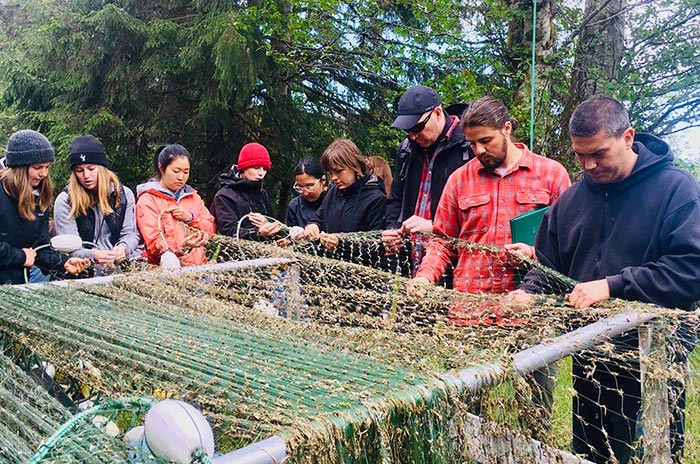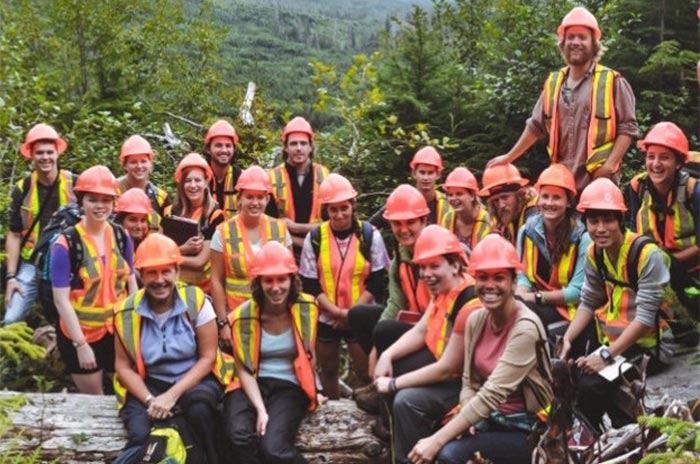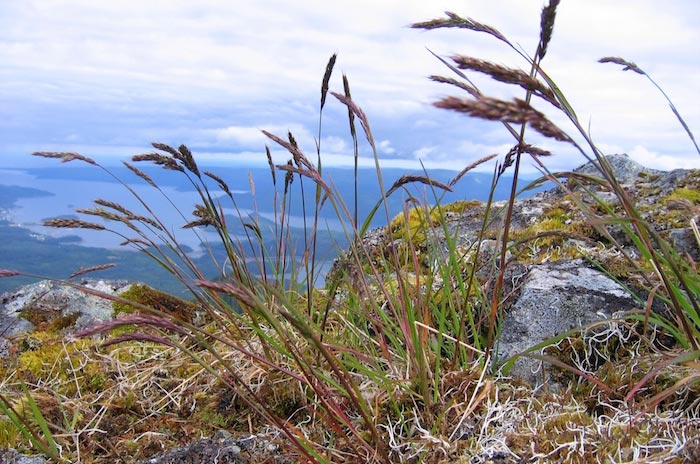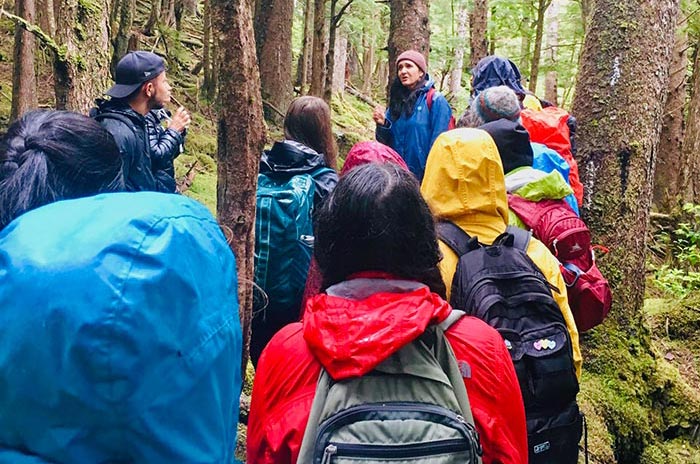Haida Gwaii Summer Session in Plants, People, and Place
May and June, HlG̱aagilda Skidegate
This program includes four block style courses, developed as a continuous two month program. Each course will include a variety of community educators and numerous field activities in the natural and human environments of Haida Gwaii. All course are accredited through UBC for a total of 12 300-level credits, and well suited for upper level undergraduate students.
The 2025 offering is currently full with a waiting list, we are now accepting applications for 2026!
Our Learning Environment
Our programs are based out of the beautiful Haida Heritage Centre at Ḵay Llnagaay, in HlG̱aagilda Skidegate BC. In addition to lectures and coursework, students will explore Haida Gwaii’s natural surroundings, connect with local experts and community educators, and become immersed in our dynamic island community.
Find out what makes the Haida Gwaii Semesters stand out from other university programs.
There are two costs associated with the program: Tuition (based on enrolment as a domestic or international student) and the Program Fee ($3,200).
Program Fee: $3,200
As this is an off-campus program, there are numerous program-related costs that tuition alone cannot cover. Costs related to the program are classroom space, guest speaker honoraria, transportation and field trips, field equipment and safety gear, etc. Please refer to the information package for more details on how and when to make this payment.
University of British Columbia Tuition
Tuition is paid to UBC directly and is based on enrolment as a domestic or international student. The fee includes the tuition costs for 12 300-level UBC credits. For more information, please visit the UBC Student Services website.
Additional Costs: Please note that students are responsible for covering the costs of their travel to and from Haida Gwaii, accommodation and living costs, as well as any recreational activities outside of the program.
How to Apply
Please click the status below that best represents you to see more information:
Ready to Apply Now?
Frequently Asked Questions about HGI Semesters and Summer Sessions
Courses

HGSE 330 – Social-Ecological Change: An Introduction to Systems Thinking and Resilience
As human beings in an interconnected world, we face a number of complex and seemingly intractable problems including such things as climate change, food security, global poverty and pandemic diseases. Fostering social and ecological resilience will help us better understand how to face and address these problems. Resilience is the ability of a linked social and ecological system to respond to stress and build the adaptive capacity of individuals and groups to respond to stress. This course provides an opportunity to learn and apply the conceptual tools of systems thinking and complexity theories for fostering social change and building adaptive capacity through application to cases on Haida Gwaii. Students are provided with an introduction to the conceptual tools of systems thinking, complexity and resilience that help understand the dynamics of social-ecological change and social innovation. The course will also involve additional local, community educators from Haida Gwaii and will incorporate local knowledge and local case examples to ground systems-based and complexity concepts.

HGSE 331 – Environmental Assessment in Cross-Cultural and Indigenous Contexts
This course is an introduction to the field and practice of environmental assessment (EA) in Canada with specific reference to EA processes in cross-cultural and Indigenous contexts. This course will make specific references to cases on Haida Gwaii and will involve additional local, community educators from Haida Gwaii. We will explore processes and techniques for incorporating environmental considerations in planning and evaluating proposals for future undertakings that may have significant social and ecological effects. The course provides an overview of the methodologies for the design and conduct of environmental impact studies that adhere to the Crown’s legal and constitutional obligations to Indigenous Peoples. The main objective of this course is to introduce students to environmental assessment, with a focus on the origins, purposes, processes and gradual evolution of EA toward a sustainability-oriented framework, with particular reference to the Canadian federal environmental assessment regime. In particular, the course will make specific reference to the incorporation of Indigenous Knowledge into EA practice and the implications of such decision-making processes in light of the Crown’s Duty to Consult and Accommodate, self-governance, self-determination and reconciliation.

HGSE 332 – Plant Ecology and Diversity
Plant ecology is the study of the distribution and abundance of plants, the effects of environmental factors upon the abundance of plants, and the interactions among and between plants and other organisms. In this course we address these topics within the ecosystems of the coastal temperate rainforest in general, and of Haida Gwaii in particular. We will discuss the history of botanical exploration, and of ecosystem classification and mapping, on Haida Gwaii. We will learn to identify key plants and ecosystems and their ecological importance. We will meet Haida botanists and land managers, to hear some of their stories about economic, social and cultural uses of plants. We’ll also spend time with wildlife biologists and recreation and tourism experts to learn about the importance of forested and non-forested ecosystems and the relationships between plants, wildlife and humans.

HGSE 333 – Indigenous Plant Knowledge: Ethnoecology and Ethnobotany
Ethnoecology is the study of cultural ecological knowledge and of the interactions between human societies and their environments, including other species. Ethnobotany is the study of the direct interrelationships between people and the plants, past, present and future. In this course we address these topics primarily within the context of Haida culture and language and the ecosystems of Haida Gwaii along with examples from other Indigenous communities in British Columbia and the Yukon. We will discuss the historical roots of ethnoecology and ethnobotany, the directions and trends in these fields over the past century, and their relevance in today’s world. It is important when discussing these topics to address the intersections between Canadian colonial history land-based practices and the ongoing impacts on Indigenous Peoples. We will learn to identify key plants and ecosystems and their cultural importance, will focus on traditional land and resource management systems, and discuss issues of ethics and intellectual properties rights in relation to Indigenous Peoples’ knowledge.
“This experience definitely changed my life. It was my first time witnessing a cut block first-hand, and
seeing how difficult sustainable forestry is – both economically and environmentally – was very eye-opening. This idea of sustainability transferred across all of our courses (as well as across scientific, political and economic boundaries), and was the first time I really felt I understood all that this word entails. I’d absolutely recommend this experience to any and all students!”
“My experience with the Haida Gwaii Semesters is one that I cherish and reflect upon frequently. What I learned from my time there has affected many aspects of my life now: education and career goals, my drive to make change, and relationships – to name a few. I view my experience as being somewhat two-fold. On one hand, we had the opportunity to learn from amazing and inspiring teachers (both course professors and guest speakers), greatly build upon our transferrable skills in research, writing, collaboration and presenting, and conduct a variety of field work, while simultaneously exploring one the most beautiful places on earth. On the other hand, this program opens the door (and pushes you through it) for personal growth. Without the program I may never have known what it feels like to find a family within my peers, to be truly welcomed into a community with such a complicated past & vibrant culture, to realize my place in this world while peering at the full moon through the crowns of western red cedars, or to be drenched head-to-toe while surrounded by decaying salmon carcasses (bring good rain pants). I wouldn’t be the same person I am today without the time I spent on the edge of this world.”
“Doing the [Natural Resource Science] semester is one of the best things I have ever done. For me, [Haida Gwaii] was the perfect place to live and learn. Combining life and learning was quite seamless and happened organically […] I still aim to return to the islands as soon as I can.”
“Natural Resource Science with Haida Gwaii Semesters was an excellent experience for me […] Each student is treated as a valuable member of the school and there is an overwhelming sense of inclusiveness when on Haida Gwaii. The connections HGHES has to resources on Haida Gwaii are unparalleled and provide a unique field school setting. The school branches out to so many different people on Haida Gwaii to come speak to the class. As a class we were also brought to numerous locations around Haida Gwaii that provided excellent settings to learn about natural resource science such as estuaries, alpine meadows, forests, beaches, and bogs […] We were able to carry out activities such as analyzing acoustic recordings, setting up pit traps, using telemetry, and assessing habitat. It is neat to be able to do all of these things with the variety of people HGHES collaborates with.”
Looking for more information?
For more information about this program, please contact hg.institute@ubc.ca


